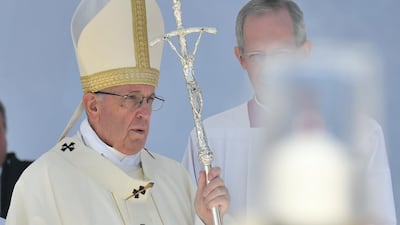The news of Pope Francis’s death will be a source of profound sorrow not only for the world’s one billion Catholics but for all people of goodwill who shared the pontiff’s heartfelt opposition to poverty and injustice as well as his desire to build bridges with different faiths.
Indeed, Pope Francis’s 12-year papacy was one marked by many firsts. In March 2013, the Argentine became the first pontiff from the Americas. He was also the first Jesuit to lead the Catholic Church’s many followers. But in the Middle East he will be remembered primarily as the first Catholic leader to visit the Arabian Peninsula and the first to visit Iraq.
Characteristically, that three-day visit in February 2019 was also defined by several firsts. More than 150,000 Catholics who live and work in the UAE queued for hours to get inside Abu Dhabi’s Zayed Sports City stadium to see the pope celebrate Mass in the Arab Gulf region for the first time. The day before, Pope Francis broke new ground by joining the Grand Imam of Al Azhar, Dr Ahmed Al Tayeb, in signing the Human Fraternity Document at the Founder's Memorial in the capital.
Although these were historic steps, they were about much more than generating a feel-good factor. Francis, as head of one the world’s oldest institutions, understood very well the fault lines of religion and politics that run through the Middle East. He spoke passionately about the violent persecution that endangered many Christian communities across the region, and established an unprecedented level of engagement between the Middle East and the Holy See.






Pope Francis’s visits to the region were more than pastoral – they were diplomatic. In March 2021, a three-day trip to Iraq saw the pontiff pray amid the ruins of four churches in Mosul, the northern city that was subject to a three-year reign of terror by ISIS. Speaking later to The National, Cardinal Louis Raphael Sako, Patriarch of Babylon of the Chaldeans and head of the Chaldean Catholic Church, said the level of respect towards Christians increased immensely after the pope’s visit. Iraq’s government went on to establish March 6 as a National Day of Tolerance and Coexistence following the pope’s historic encounter in Najaf with Grand Ayatollah Ali Al Sistani.
In November the following year, Pope Francis returned to the Gulf on a milestone visit to Bahrain, underlining his support for respect, dialogue and tolerance among the communities of the Middle East. He also lent the Vatican’s considerable diplomatic weight to one of the region’s most intractable problems – the Palestine-Israel conflict. Five years before his journey to the UAE, Pope Francis visited the Holy Land where called for a two-state solution and invited leaders from both sides to attend the Vatican for peace talks. His feelings about the loss of life in Gaza were clear: “This is cruelty, this is not war,” he told Vatican cardinals in an address last December.








Sadly, conflict continues to reign in Palestine, but Francis was a constant presence, even during its darkest days. His daily phone calls to Gaza’s small and beleaguered Catholic congregation were a demonstration of how much the Middle East featured in his papacy.
In recent weeks and during Easter – a profoundly spiritual time for many Christians – thousands of Catholics across the Arab world remembered Pope Francis in their prayers as the 88-year-old fought a serious respiratory illness. In Dubai, Father Michael Cardoz, who has served the Southern Vicariate of Arabia for 37 years and met Francis personally, described the pontiff as “a pope who walks the walk, and talks the talk”.
This is an apt description of a man characterised by integrity and possessed of deep religious learning. But his time in the Middle East also showed him to be someone who understood the power of his office and the need to use it for good. Pope Francis was the first pontiff to visit Arabia; let’s hope that he is not the last.


